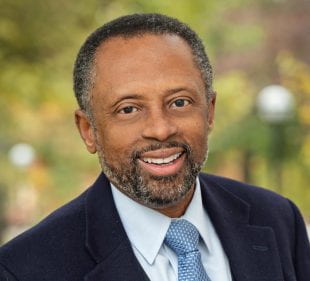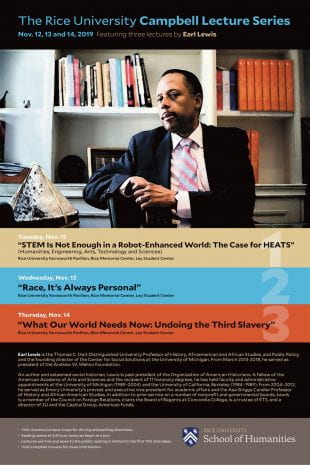Three-night event will address STEM’s shortcomings, race and modern-day slavery
Technological change happens so rapidly in the 21st century it’s possible to learn a skill one year that’s moot in three years, if not sooner. This, argues noted social historian and award-winning author Earl Lewis, is just one reason the smartest scientists — and other STEM-oriented scholars — work with humanists.

Noted social historian and award-winning author Earl Lewis will speak Nov. 12, 13 and 14 in Farnsworth Pavilion in the Ley Student Center.
“Education is actually designed to encourage the individual to consider questions they hadn’t considered before,” Lewis said in a recent Big Think interview. “If you are really and truly educated, you know how to go about pursuing the new acquisition of information — and that information you can then synthesize and apply to what you already know. This means you’re not behind the curve; you’re keeping pace with the change that’s always occurring both in technology and other aspects of American life.”
Lewis, a former president of the Andrew W. Mellon Foundation and a speaker who’s in demand across the nation, will take the stage three nights in a row for the 2019 Campbell Lecture Series.
Each lecture will last one hour, including questions from the audience, and will take place Nov. 12, 13 and 14 in Farnsworth Pavilion in the Ley Student Center. Seating opens at 5:45 p.m.; lectures will begin at 6 p.m.
Each year, the Campbell series invites a distinguished humanities scholar to lecture on a topic of broad humanistic interest. Through a special arrangement with the University of Chicago Press, the lectures are later published as a book.
This year, Lewis, who formerly served as vice provost for academic affairs for graduate studies and dean at the University of Michigan and as provost and executive vice president for academic affairs at Emory University, will use his three nights at the podium to speak on a variety of topics.
“I hope Professor Lewis will stimulate new conversations about the potential for new and meaningful collaboration between the Humanities and the STEM fields — a topic particularly pertinent on our campus but also beyond it,” said Dean of Humanities Kathleen Canning. “I also think students, faculty and members of the public will leave Professor Lewis’s lectures with a renewed understanding of the promise of the university to address urgent social questions, and of the necessity of excellent scholarship for building a just world.”
 In his first lecture on Nov. 12, “STEM is Not Enough in a Robot-Enhanced World,” Lewis will make the case for “HEATS,” or humanities, engineering, arts, technology and sciences.
In his first lecture on Nov. 12, “STEM is Not Enough in a Robot-Enhanced World,” Lewis will make the case for “HEATS,” or humanities, engineering, arts, technology and sciences.
The Nov. 13 lecture is entitled “Race, It’s Always Personal,” and the Nov. 14 lecture will speak to “What Our World Needs Now: Undoing the Third Slavery.”
That last topic refers to the work Lewis is doing in his capacity as the founding director of the University of Michigan Center for Social Solutions. The center’s Third Slavery Project works toward solving the present-day problems of involuntary servitude, forced labor, human trafficking and other contemporary forms of slavery-like practices.
“Today it is estimated 40 million people are enslaved, whether working in a field, factory or massage parlor,” Lewis said in a recent University of Michigan video. “We believe we can produce measurable change in behavior as well as producers’ and consumers’ attitudes by scaling a campaign to make and purchase slave-free products through education, certification, scalable implementation and evaluation. We can change outcomes.”
The 2019 Campbell Lecture Series is free and open to the public. For more information, visit campbell.rice.edu.

